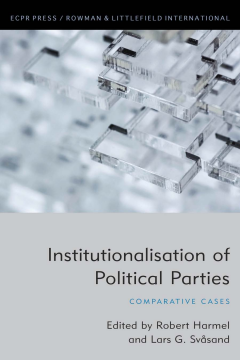
Additional Information
Book Details
Abstract
This edited collection builds directly upon the recently published book by Harmel, Svåsand, and Mjelde (Institutionalisation (and De-Institutionalisation) of Right-Wing Protest Parties: The Progress Parties in Denmark and Norway) and applies their conceptual framework to a wide range of additional cases. Employing a common conceptual framework throughout, the chapters cover a broad range of cases and make important contributions toward building theories on why some parties succeed in institutionalising while others fail. The book is primarily about the status some parties achieve as an ‘institution’, the means by which parties may acquire that status, and some of the obstacles that stand in their way.
This book’s coordinated studies contribute to important contemporary debates about the rise and decline of parties and party systems, offering useful new insights about what it means for parties to become institutionalized, and what it takes for them to reach this stage.
Susan Scarrow, Department Chair of Political Science, University of Houston
This remarkable and insightful book includes a most impressive and important collection of case studies written by a truly international team of scholars. It provides a theoretically grounded authoritative assessment of party institutionalization under comparative perspective. The rich set of empirical findings will be a central point of reference in party politics. A brilliant incentive to do further research in the field.
Ferdinand Müller-Rommel, Professor of Comparative Politics, Leuphana University of Lüneburg
This book offers a solid and nuanced conceptual framework for answering one of the very important questions of our time: why some of the many new political parties that entered the scene in new democracies or in the dealigning old democracies institutionalize, while others fail to do so. Here is a very valuable contribution to our understanding of party politics on the move.
Kris Deschouwer, Research Professor in the Department of Political Science, Vrije Universiteit Brussels
Most new parties struggle to institutionalise, irrespective of their ideology or organisational structure. This edited volume highlights the challenges faced by new parties in a variety of countries – ranging from Argentina to Japan and from Greece to Sweden – and a variety of party families – from the extreme left to the extreme right. It convincingly demonstrates that both external and internal institutionalisation are a precondition for sustained success and these forms of institutionalisation come about through a complex interplay of party characteristics and contextual factors. The broad scope of the volume makes it an essential read for party politics scholars from across the world.
Sarah de Lange, Professor, Department of Political Science, University of Amsterdam
Viewing party institutionalization along three dimensions—internal, external, and temporal—Harmel and Svåsand advance scholarly analysis of this important but elusive concept. Moreover, they offer revealing case studies on the process of institutionalization from party systems in Europe, Latin America, and Japan. This book not only improves our thinking of party politics but also our knowledge of its practice.
Kenneth F. Janda, Payson S. Wild Professor Emeritus of Political Science, Northwestern University
Table of Contents
| Section Title | Page | Action | Price |
|---|---|---|---|
| Institutionalisation of Political Parties | Cover | ||
| Contents | vii | ||
| List of Abbreviations | ix | ||
| List of Tables | xiii | ||
| List of Figures | xv | ||
| List of Appendices | xvii | ||
| Preface and Acknowledgements | xix | ||
| 1 Introduction | 1 | ||
| 2 Party Institutionalisation: Concepts and Indicators | 9 | ||
| 3 The Institutionalisation of New Parties in Greece: (How) Does it Matter for Success? | 25 | ||
| 4 The Role of Leader in the Process of Institutionalisation of Entrepreneurial Parties: Czech ANO and the Public Affairs Party | 43 | ||
| 5 Institutionalisation of New Political Parties in Argentina: The Case of Propuesta Republicana Party | 69 | ||
| 6 De-Institutionalising Power of Decision-Making Personalisation: The Paradigmatic Case of the Serbian Communist-Successor Party | 89 | ||
| 7 Inverse Relationship between Party Institutionalisation and Party System Competitiveness: The Transformation of Postwar Japanese Party Politics | 111 | ||
| 8 The Uneven Institutionalisation of the Green Party in Poland | 133 | ||
| 9 The Swedish Pirate Party: Towards Institutionalisation? | 155 | ||
| 10 Institutionalisation of a Charismatic Movement Party: The Case of Croatian Democratic Union | 171 | ||
| 11 The Institutionalisation of Parties and Coalitions in Romania: An Unfulfilled Process? | 193 | ||
| 12 Party Institutionalisation in the Czech Republic | 215 | ||
| 13 The Organisational Fabric between Citizens and the Government: Institutionalisation and Intermediary Organisations | 239 | ||
| References | 259 | ||
| Index | 287 | ||
| About the Contributors | 295 |
